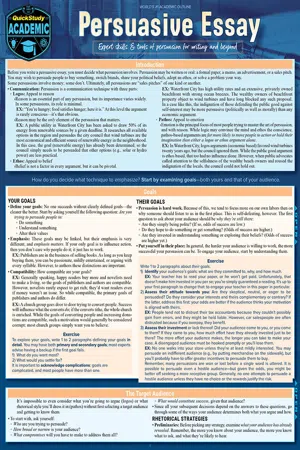
- 44 pages
- English
- ePUB (mobile friendly)
- Available on iOS & Android
eBook - ePub
About this book
The most important form of writing in academics whether for class or for standardized tests is the same skill of persuasion that is monumentally important in life. This digital guide has the essentials of building a level of persuasion that cannot be beat. With the task of "selling a jar of trouble" the breakdown of skills to selling an idea, concept or viewpoint in essay form are just as useful for a speech, debate or a sales pitch. Boost scores for essays and on standardized tests for less money than the cost of lunch.
- Communication & Ethos
- Goals
- The Target Audience
- The Unintended Audience
- Engaging the Audience
- Authority & Audience
- Identifying with the Audience (Immersion)
- Venue Matters
- The Vexed Problem of Literacy
- Outline: How to Persuade People to Buy Trouble
- Sample Persuasive Essay & Breakdown
Tools to learn more effectively

Saving Books

Keyword Search

Annotating Text

Listen to it instead
Information

Venue determines subject matter.
Venue Matters
What any given individual expects varies depending on the venue (the locale or setting).
- Venue determines subject matter.
- At its most basic, venue determines what subject will be accepted and what won’t be.
EX: Imagine the same person in a store, a doctor’s office, and a classroom. In the store they want to buy something, or at least check availability and prices. In the doctor’s office they want a prescription or a follow up, and in the classroom they want to discuss Hamlet.- Expectations are almost entirely controlled by venue; ignore it at your peril.
EX: Don’t try to persuade a person to re-evaluate your paper in the store or the waiting room; you will only annoy them. - Venue determines approach.
- Venue may determine what approach works and what doesn’t.
EX: Joan and Wendy both want jobs, one at a corporate office and one as a professor. Businesses prefer 1 to 2 page resumes, whereas professors want your entire academic life spelled out in detail. Here, it is crucial that Joan and Wendy understand and work within the expectations of their fields, even to get to the interview stage. - Venue determines terminology.
- Unless your target audience is exceedingly naive, you generally can’t persuade anyone to accept you without first establishing yourself as an insider—someone who understands what is expected in their world. Here, terminology (whether written or oral) is crucial. And while no single word or reference will prove your qualifications, one wrong phrase is definitely enough to lose all influence.
EX: Dr. Smith winces every time a student cites “the Bible” in a research paper. This has nothing to do with Dr. Smith’s religion (he’s a Methodist). To him, such references prove that the student does not understand peer-reviewed sources and cannot even distinguish between translations.- If you must try to persuade people as an outsider, it’s best to admit your status frankly, say why they should listen to you anyway, and show them how diligently you’ve tried to learn their rules.
- Instructors are not all alike: Of all groups, students are most likely to ignore their target audience: their instructor. Divided by training and background, the gulf between student and instructor can be hard to bridge. Yet of all our groups, students are in the best position to know what their target audience wants and how to approach it.
- Character: What is this particular instructor looking for? Don’t write for the last science instructor you had, or the last person whose prompt seemed familiar; write for this one. After all, you’ve been listening to this person all semester. What do they emphasize? EX: My teacher talks a lot about research, criticizes the five paragraph essay, reiterates her interest in new ideas, and emphasizes women and minorities. To persuade her, I probably need to write about something un-traditional: show that I can think outside the mold.
- Genre expectations: Before you write for any instructor, make sure you know exactly what professionals in that field of study expect. What is “normal” in the community your instructor inhabits? Ask yourself the following questions:

- What does your instructor focus on?
- What kind of evidence does your instructor expect?
- What sort of language does your instructor use?
- What does your instructor take for granted?
- Character: What is this particular instructor looking for? Don’t write for the last science instructor you had, or the last person whose prompt seemed familiar; write for this one. After all, you’ve been listening to this person all semester. What do they emphasize?
It’s okay to judiciously violate expectations, but never ever do it by accident: make sure you know how your instructor will “read” your surprise.
EX: My high school teachers didn’t ask us to write “scholarly” papers, but she does. My community college professor gave us prompts to write from, but she doesn’t. This makes me nervous. I’ll write my paper proposal early and discuss it with her. Then I’ll ask for a sample bibliography so I know what she expects.
- Analyzing expectations: It is difficult to put yourself in the shoes of someone with an idea of “normal” that is not yours. Most of us know what we expect, and we all have our own comfort zone. Persuasion, however, puts the burden of initiative on us, not them. To persuade an instructor, start by asking yourself what your instructor assumes. EX: You are writing a paper for a social science class and are at a loss for what to write. Thinking back on the class, you recall that Dr. Jones is particularly interested in cultural artifacts. You have studied what you can of ancient civilizations through surviving artifacts and have gone to the local museum.Warning: So far, so good. Merely regurgitating what Dr. Jones said about cultural artifacts and civilization never works, however; you’ll never be the expert in someone else’s field of expertise. Instead, re-examine your own knowledge base through her lens. What do you know that you never thought of in terms of cultural artifacts—but could?
- Getting down to brass tacks: In persuasion, as in argument, “the devil’s in the details.”

- Keeping your instructor’s perspective in mind, list 3 to 5 things you might argue that you think your instructor is looking for. Avoid vague generalizations. Make sure you write several sentences about each one without sarcasm. They should be from their point of view, not yours.
EX: You start by listing some of the differences between artifacts common to different cultures, and what they indicate. Next, you list modern artifacts. Finally, you write a sentence or two about the similarities and differences between the two, as your professor did in class. - Juxtaposition: Look for the overlap between what your instructor wants, and what you think you can manage.
Note: When looking for overlap, don’t forget to consider how you could repackage your areas of expertise to fit your instructor’s expectations. Half of all papers fail simply because the student hasn’t come up with an idea that requires defending. ...
Table of contents
- Introduction
- Goals
- The Target Audience
- The Unintended Audience
- Engaging the Audience
- Authority & Audience
- Identifying with the Audience (Immersion)
- Venue Matters
- The Vexed Problem of Literacy
- Outline: How to Persuade People to Buy Trouble
- Sample Persuasive Essay
Frequently asked questions
Yes, you can cancel anytime from the Subscription tab in your account settings on the Perlego website. Your subscription will stay active until the end of your current billing period. Learn how to cancel your subscription
No, books cannot be downloaded as external files, such as PDFs, for use outside of Perlego. However, you can download books within the Perlego app for offline reading on mobile or tablet. Learn how to download books offline
Perlego offers two plans: Essential and Complete
- Essential is ideal for learners and professionals who enjoy exploring a wide range of subjects. Access the Essential Library with 800,000+ trusted titles and best-sellers across business, personal growth, and the humanities. Includes unlimited reading time and Standard Read Aloud voice.
- Complete: Perfect for advanced learners and researchers needing full, unrestricted access. Unlock 1.4M+ books across hundreds of subjects, including academic and specialized titles. The Complete Plan also includes advanced features like Premium Read Aloud and Research Assistant.
We are an online textbook subscription service, where you can get access to an entire online library for less than the price of a single book per month. With over 1 million books across 990+ topics, we’ve got you covered! Learn about our mission
Look out for the read-aloud symbol on your next book to see if you can listen to it. The read-aloud tool reads text aloud for you, highlighting the text as it is being read. You can pause it, speed it up and slow it down. Learn more about Read Aloud
Yes! You can use the Perlego app on both iOS and Android devices to read anytime, anywhere — even offline. Perfect for commutes or when you’re on the go.
Please note we cannot support devices running on iOS 13 and Android 7 or earlier. Learn more about using the app
Please note we cannot support devices running on iOS 13 and Android 7 or earlier. Learn more about using the app
Yes, you can access Persuasive Essay by Kathryn Jacobs in PDF and/or ePUB format, as well as other popular books in Languages & Linguistics & Creative Writing. We have over one million books available in our catalogue for you to explore.